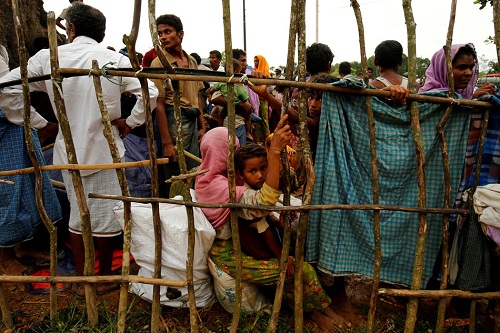Reuters photo
By
Kingson Chingakham
Rohingya Muslims from the Rakhine State, Myanmar continue to be victims of a gross violation of human rights. On August 24th, fresh violence erupted in the Rakhine state which led to a mass exodus to Bangladesh. But Bangladesh has been very unwelcoming in receiving these refugees. According to the International Organization of Migration, around 4,000 migrants have been stranded at the Bangladesh border.
Sheikh Hasina, the Prime Minister of Bangladesh has shown concern over the latest development and has urged the United States of America to put political pressure on Myanmar to prevent such mass exodus to neighbouring countries and to take back the refugees. Bangladesh has already hosted around half a million Rohingyas and is not in the capacity to host more due to national security and economic burden.
Who are Rohingyas?
The Rohingya Muslims are a group of ethnic people who have been denied citizenship in Myanmar as per the 1982 Citizenship Law. The debate of whether they existed before the arrival of the British or not continues. But they have been oppressed at their home in Myanmar and the neighbouring countries have closed the doors taking a blind eye approach to their miseries on account of strategic geopolitical calculations. They have been neglected by the mainstream media and international community, especially the West, due to the overshadowing problem of the European refugee crisis. They do not have land they can call home, where they can claim citizenship and other legal protections.
The military has killed hundreds of them, many have disappeared, and women have been sexually abused. Those who escaped this brutal violence did not in any way get better lives. Most of them have either been stranded in the borders or they have been traded by human traffickers.
Where is India on Rohingya Issue?
India does not want to get involved in this issue on the excuse that it is an internal matter of Myanmar. Both China and India considerably helped Nepal in the 2015 earthquake on the grounds of strategic and humanitarian reasons. But both countries do not see the Rohingyas as of any strategic value. We can not blame both countries for not being very outspoken about the violence in the Rakhine state as India and China already have enough human rights violation cases internally. But both countries have foreign policies to engage with the east (in the case of India – Act East Policy) and south (for China- south-south cooperation).
The report card shows that India has accommodated Rohingyas more than the Chinese over the past years. But the willingness to accommodate them is decaying and the Rohingyas face continued challenges like imprisonment in connection to illegal entry to the country. Being the largest democracy in the world, many have criticized India for not signing the United Nations Refugee Convention, 1951 or its Protocol of 1967 which obligates the countries to accept refugees. In the far northern part of India, the state of Jammu & Kashmir has settled enough refugees. The Bharatiya Janata Party (BJP), which is in power in coalition with the Jammu and Kashmir Peoples Democratic Party (JKPDP), has demanded to clear the refugees from the state. On the other hand, Vishwa Hindu Parishad, an Indian right-wing Hindu nationalist organisation, looks at the Rohingyas as a form of security threat.
In 2016, the National Democratic Alliance (NDA) government proposed an amendment in the Citizenship Bill, 1955. The Bill proposes that Hindu, Sikhs, Jains, Parsis and Christians entering India from Afghanistan, Bangladesh and Pakistan not be considered as ‘Illegal immigrants’. The Bill is definitely pro-minority but it is bias towards Muslim minority. The reason might have been because these three countries comprise of a Muslim population in the majority. The Bill does not give any hope to the Rohingyas as it is geographically and religiously limited to particular sections.
Even if Delhi isn’t concern about the human rights, it can definitely work on trying to build stability and peace in Myanmar. If the violence continues, there are high possibilities of a spillover effect to India as there have been many reports of radicalization of the Rohingyas. This process of massive radicalization will pose a security threat to an already insurgent prone region of North East India which borders with Myanmar. It is therefore advisable to take preventive measures rather than race for a cure at the earliest. New Delhi’s creative diplomacy has been applauded by the international community. With different think tanks, experienced diplomats, robust civil society, media, and human rights groups, a platform for all the countries affected by the Rohingya crisis can be created that can work to solve the issue and rehabilitate this minority.
If the Hindu minorities in Bangladesh and Pakistan are persecuted, India takes serious measures to shelter them in the country. The diplomatic channels are also opened to solve such issues. The double standard has been exposed in this respect because Rohingyas are also minorities in our neighbouring country who have been persecuted on a larger scale. When the Hindu minorities in Bangladesh and Pakistan suffer, isn’t it the internal matter of the respective countries? But India has helped in many instances in spite of being internal matters of the respective countries. Why do we have to take a step back with Rohingyas with the excuse of it being an ‘internal matter’? India’s selective approach with a religious angle should be done away with and equal treatment given on humanitarian grounds.
Conclusion
As one of the fastest growing economies in the world and being a role model of democracy for many countries in the region, if India wants to exert herself as a regional leader, we have to weigh equal importance with the moral and spiritual values along with the strategic interests. India can definitely intervene to stop funding from different terrorist organizations and help in preventing such recruitment from the Rohingyas. Since the Rohingya issue will have serious security implications on India, involvement in finding a solution will definitely serve India’s national interests.
Kingson Chingakham
Kingson Chingakham is a citizen journalist based in Delhi, India. He is currently pursuing M.A Political Science from the University of Delhi. Politics and Society are his core interests. He has recently started contributing stories to Indian media houses. He aims to become a Political Journalist in the near future.



An interesting article and any intervention is on humanitarian grounds and uphold international law. This crisis is ethnic cleansing by Myanmar's Buddhist Apartheid regime and forces and must be put an end this madness by all means. India has been a failure since demise of Mrs. Indra Gandhi, iron lady with principles who separated and created Bangladesh. Military intervention in Myanmar will send signals to other nations including Sri Lanka to stop ethnic cleansing. Muslim nations in the region notably Bangladesh, Indonesia, Pakistan, Malaysia must jointly take a strong action as International community failing and wasting time as human lives are lost at an alarming rate. It is sad and cruel that powerful nations look for economic and strategic reason to intervene and not on International law and humanitarian basis. International community continues to lose confidence, credibility and no one can trust them as they apply double standard policies and support oppressive regimes.